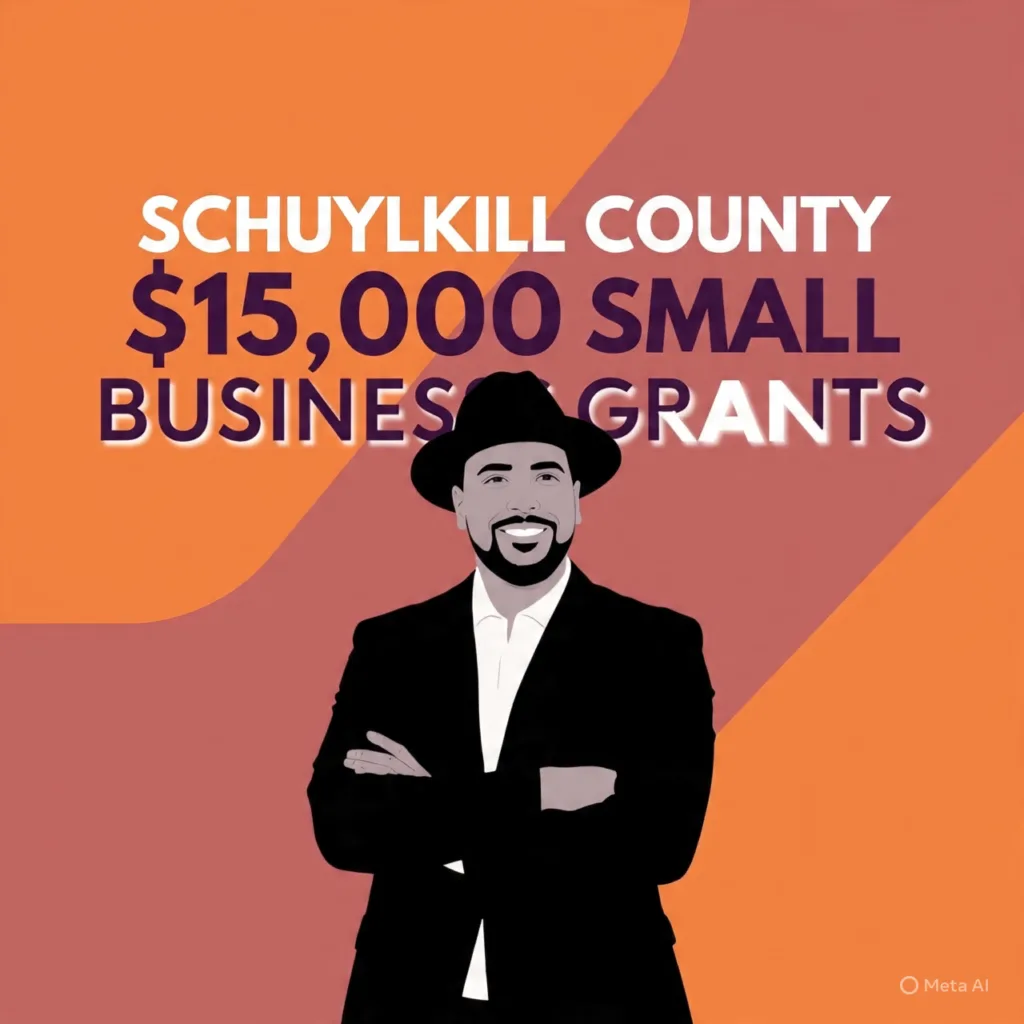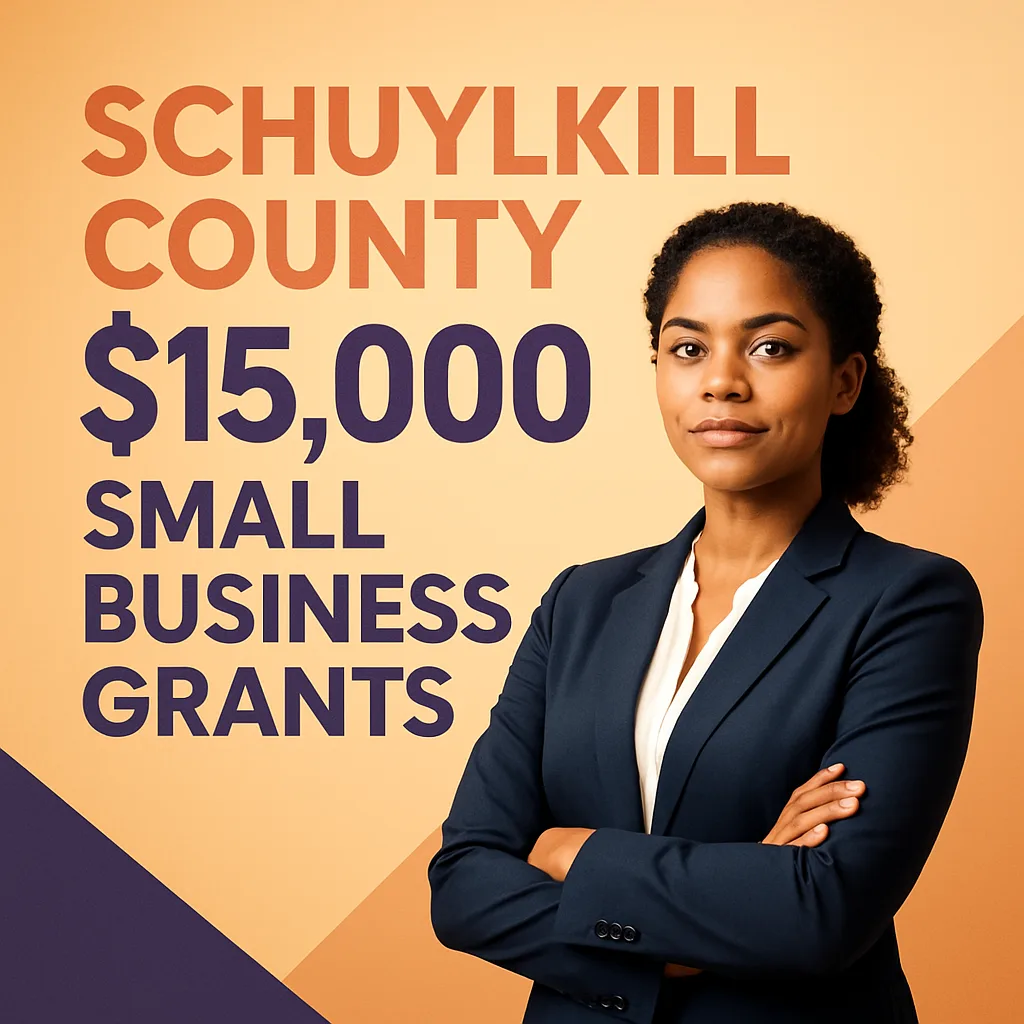
Schuylkill County Community Development Block Grant: $15,000 Small Business Grants Still Taking Applications
Still accepting applications for up to $15,000 forgivable business loans in Schuylkill County. Small business grants & loans without any deadline.
Grant Overview
Get Up to $15K in Forgivable Business Funding – No Deadline Pressure
Small business grants in Pennsylvania don’t usually stay open this long, but here we are. Schuylkill County’s Community Development Block Grant program is still accepting applications for up to $15,000 per business. And yes, these loans turn into grants when you meet the requirements – which honestly aren’t that complicated.
I know what you’re thinking. Another COVID relief program that’s probably dried up by now? Actually, no. The Grantaura team has been tracking this one, and applications are genuinely still being processed on that first-come, first-served basis they mentioned back in 2021.
The thing is, most business owners in Schuylkill County don’t even know this exists. I’ve talked to plenty of small business owners who are still struggling with cash flow issues from the pandemic era, and they have no clue there’s $15,000 sitting there waiting for them to apply.

Here’s What Actually Happened With This Program
Back when everything shut down, Schuylkill County got this chunk of CDBG-CV money (that’s Community Development Block Grant – Coronavirus funding, if you care about the acronyms). Instead of creating some complicated bureaucratic mess, they partnered with NEPA Alliance to actually get money to businesses. Similar to how we help people find the right funding opportunities, NEPA Alliance has been handling the underwriting and making it work for real businesses.
The Northeastern Pennsylvania Alliance isn’t some random organization, by the way. They’ve been doing economic development work across seven counties in northeastern PA for decades. When Schuylkill County needed someone to handle this program properly, NEPA Alliance was the obvious choice.
What’s interesting is how they structured this. Most government programs either give you a grant upfront (and then audit you to death later) or give you a loan that you have to pay back no matter what. This one splits the difference. You get the money as a loan, but if you do what you said you’d do – mainly keep or create one job – it converts to a grant.
Q: What exactly do I need to do to get the loan forgiven?
A: Create or retain one full-time equivalent job for someone earning $37,150 or less annually, and keep your business open for 6 months.
Q: Can I be that employee if I’m the business owner?
A: Yes, if your business has fewer than 4 other employees.
Q: What if I can’t meet the job requirement?
A: Then you pay back the loan on a prorated basis over 6 months – it doesn’t all come due at once.
The Real Requirements (Without the Government Jargon)
You need to be located in Schuylkill County, but not in Schuylkill Haven or Pottsville – they run their own programs. Your business can’t have more than 20 employees. You need to show that COVID messed with your revenue between March 2020 and December 2020. And you need to be current on your taxes.
That’s it. No complicated point systems, no industry preferences, no demographic requirements. Just show that the pandemic hurt your business and that you can create or keep a job. Unlike many location-specific grants we track, this one keeps things simple.
The job creation thing trips people up, but it shouldn’t. If you’re a solo business owner or you have just a few employees, the job you create or retain can literally be your own position. As long as it pays less than $37,150 per year (which the application materials say qualifies automatically), you’re good.
How the Money Actually Works
This isn’t play money with a bunch of restrictions. You can use it for working capital, payroll, rent, utilities, supplies for day-to-day operations, insurance, accounting services, legal fees, advertising, inventory, equipment. Basically, the stuff that keeps businesses running.
There are some things you can’t use it for – they call them “sin businesses” which includes golf courses, country clubs, massage parlors, gambling facilities, and stores that mainly sell alcohol. Similar restrictions exist on other business funding programs we’ve covered, so this isn’t unusual.
The key thing about CDBG funds is that they have to be your last source of funding, not your first. So if you got PPP money or other federal COVID assistance, you can’t use this CDBG money for the same expenses. They’re serious about avoiding duplication of benefits.
Q: I got PPP loans. Can I still apply?
A: Yes, but you can’t double-dip on the same expenses.
Q: What documentation do I need to prove COVID impact?
A: Monthly P&L statements or revenue receipts showing the decline between March 2020-December 2020.
Q: How long does the application process take?
A: NEPA Alliance does the underwriting and makes recommendations to Schuylkill County, who then disburses the funds.
What NEPA Alliance Actually Does
Stephen Ursich at NEPA Alliance is the guy handling these applications (570-891-4649, recovery@nepa-alliance.org). When I looked into their background, similar to how Grantaura serves as a resource hub, NEPA Alliance has been the go-to economic development organization for northeastern Pennsylvania for years.
They don’t just process paperwork. NEPA Alliance does real underwriting – looking at whether your project costs make sense, whether you have other funding sources lined up, whether your business is actually financially feasible, and whether the return on investment is reasonable. These are the same criteria any serious lender would use.
But here’s the thing – they understand small businesses. When they evaluate whether project costs are “reasonable,” they’re not comparing you to some Fortune 500 company. They know what it costs to run a small business in Schuylkill County.
The six-month operational commitment isn’t arbitrary either. It ensures that businesses using federal community development funds are genuinely trying to stay in business and support their communities, not just grabbing cash and running.
Strategic Application Tips That Actually Matter
Your COVID impact narrative needs to be specific. Don’t just say “the pandemic hurt my business.” Show the numbers. If your March 2020 revenue was $8,000 and your March 2021 revenue was $5,000, say that. Just like with competitive business grants we profile, specificity matters.
When you’re describing how you’ll use the funds, think about it from their perspective. They want to see that this money will genuinely help sustain or create employment. If you’re buying equipment, explain how that equipment helps you serve customers better or more efficiently. If you’re using it for working capital, show how that translates to keeping people employed.
The application asks for your 2019 and 2020 business tax returns and P&L statements. Have these ready and make sure they tell a consistent story. If your tax return shows one revenue number but your P&L shows something completely different, that’s going to raise questions.
For the job creation/retention documentation, you need to be specific about the position. Job title, hours per week, rate of pay. If it’s a filled position, you need the self-certification form. If it’s multiple part-time positions that add up to 40 hours, document all of them.
Q: Should I apply for the full $15,000?
A: Only if you can justify it with your documented losses and business needs.
Q: What happens if I apply and don’t get approved?
A: NEPA Alliance will tell you why. Sometimes it’s fixable documentation issues.
Q: Can I reapply if I get rejected?
A: Yes, if you address whatever issues caused the initial rejection.
Why This Program Still Has Money Available
Most businesses don’t know about it, frankly. The initial announcement was in 2021, and a lot of business owners were overwhelmed trying to figure out PPP, EIDL, and all the other alphabet soup of COVID programs. By the time things settled down, many people assumed all the COVID funding had dried up.
Also, the application process requires actual documentation. You can’t just fill out a form online and hope for the best. You need tax returns, financial statements, proof of COVID impact. That eliminates the people who aren’t serious about it.
The geographic restrictions help too. This is only for Schuylkill County businesses (excluding two municipalities), so you’re not competing with every small business in Pennsylvania. Similar to targeted demographic grants, the smaller applicant pool increases your odds.
The Federal CDBG Context You Should Understand
Community Development Block Grants come from HUD and flow through state governments to local communities. The CV designation means it’s CARES Act money specifically for coronavirus response. Pennsylvania’s Department of Community and Economic Development administers the state program.
The low-to-moderate income job requirement isn’t just bureaucratic nonsense – it’s how CDBG funds are supposed to work. The whole point is economic development that benefits people who need it most. The $37,150 threshold is tied to HUD’s Section 8 low-income limits.
Understanding this context helps you frame your application properly. This isn’t just business funding – it’s community development funding that happens to use businesses as the vehicle. When you explain how the grant will help your business, also explain how it benefits your community and your employees.
Common Mistakes That Kill Applications
Incomplete documentation is the big one. Don’t submit your application until you have everything they asked for. Missing tax returns or P&L statements will just delay the process.
Vague COVID impact descriptions don’t work. “The pandemic was hard for everyone” isn’t documentation. Show the specific revenue decline during the qualifying period.
Unrealistic funding requests raise red flags. If your business has $50,000 in annual revenue, requesting $15,000 for “working capital” without explaining exactly what that means looks suspicious.
Not understanding the job requirement causes problems. Like how Grantaura helps businesses navigate complex requirements, you need to be clear about how you’ll meet this obligation.
Q: What if my business grows beyond 20 employees while my application is pending?
A: Current employee count matters, so this could affect your eligibility.
Q: Do I need to hire someone new, or can I retain existing employees?
A: Either works – job creation OR retention both qualify.
Q: What if I have seasonal employees?
A: They count as permanent only if the season is long enough to be considered their principal occupation.
Let me be honest with you about something. Navigating federal grant requirements while trying to run your business is genuinely challenging. The application itself isn’t that complicated, but understanding how to position your request for maximum approval chances – that’s where experience matters. If you’re serious about securing this funding and want expert guidance through the process, that’s exactly what we do at Grantaura. Click here to get professional grant proposal writing help.
Donor: Schuylkill County, Northeastern Pennsylvania Alliance (NEPA)
Focus: small business recovery, COVID relief, job retention, working capital, community development, economic assistance, forgivable loans, CDBG funding
Region: Schuylkill County, Pennsylvania, United States (excluding Schuylkill Haven and Pottsville)
Eligibility:
– For-profit businesses located in Schuylkill County, PA (excluding Schuylkill Haven and Pottsville)
– Maximum 20 employees
– Business operational since March 1, 2019
– Demonstrated cash loss or revenue decline between March 1, 2020 and December 31, 2020
– Must create or retain at least one full-time equivalent job for low-moderate income individual ($37,150 or less annually)
– Current on federal, state, and local taxes
– Must remain operational for 6 months following award
– Cannot be classified as “sin business” (golf courses, country clubs, gambling facilities, etc.)
Benefits:
– Financial Award: Up to $15,000 as forgivable loan (converts to grant upon meeting program requirements)
– Flexible Usage: Working capital, payroll, rent, utilities, supplies, insurance, professional services, advertising, inventory, equipment
– Rolling Applications: No application deadline – processed first-come, first-served
– Local Administration: Managed by experienced regional economic development organization
– Business Support: Technical assistance available through NEPA Alliance
Deadline: Rolling
Terms:
– CDBG-CV: Community Development Block Grant CARES Act funding specifically for coronavirus prevention, preparation, and response activities
– Loan-to-Grant Conversion: Initial funding provided as loan that becomes a grant when program requirements are satisfied within 6 months
– Full-Time Equivalent (FTE): 40 hours per week of employment, achievable through one full-time position or combination of part-time positions (maximum 4 people per FTE)
– Low-to-Moderate Income Threshold: Individual earning $37,150 or less annually (simplified through federal waiver for this program)
– Duplication of Benefits: Federal prohibition against using multiple funding sources for identical expenses
– Anti-Pirating Provisions: Cannot use funds to relocate business operations between labor markets
– Underwriting Standards: HUD evaluation criteria including reasonable costs, committed financing, financial feasibility, and appropriate return on investment
Author: Imran Ahmad founded Grantaura after seeing too many small businesses struggle to access the funding they desperately needed, especially during economic downturns like the COVID pandemic. Having worked directly with business owners who missed out on programs like this Schuylkill County CDBG opportunity simply because they didn’t know it existed, Imran recognized that information access is often the biggest barrier to securing funding. Through Grantaura’s comprehensive database and expert consultation services, Imran has helped hundreds of businesses navigate complex federal and state grant requirements, understanding that behind every application is a real person trying to keep their dream alive and their community employed.
How to apply for this grant
We are your trusted grant application partners. You can navigate the entire grant application process with our expert guidance through this simple 5-step process.
Step 1: Application Form
Fill out the “Apply for this grant” form with your information and grant requirements.
Step 2: Eligibility Assessment
Our grant experts will assess your eligibility and notify you via email.
Step 3: Expert Consultation
A dedicated grant expert will be assigned to discuss next steps for your application.
Step 4: Application Submission
Our expert will help you complete and submit your application with all required materials.
Step 5: Final Decision
The grant committee will make their decision and notify successful applicants.













